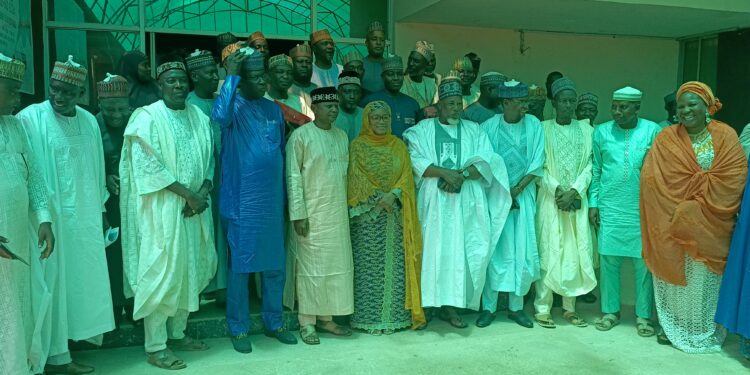Bauchi government reduces number of out-of-school children from 1.5m to 521,000


The Bauchi State Government has reported a considerable fall in the number of out-of-school children in the state, with the total now down to 521,000 from 1.5 million.
Dr. Jamila Dahiru, Commissioner of Education, made the disclosure while presenting the Ministry’s achievements during the 2024 Ministerial Press Briefing, which was held on Tuesday at the State Secretariat Conference Hall.
The Commissioner claimed that the drop was attributable to the government’s many methods implemented through the Ministry and SUBEB to ensure that all out-of-school children were taken to school.
According to her, “I stand before you today filled with immense pride and optimism for the future of education in our beloved state. We are fortunate to be part of a nation where the current educational system provides a strong foundation for learning and development.”
She added, “Within Bauchi State, our active efforts are geared towards translating the educational framework into tangible outcomes for every child. Currently, the basic foundation of education in the state falls under the purview of the Ministry of Education, which includes six departments, agencies, and boards (the State Universal Basic Education Board, Special Schools Board, and Library Board, as well as the State Agencies for Mass and Nomadic Education).”
Jamila Dahiru added, “The Ministry of Education, along with the Special Schools Board and State Universal Basic Education Board (SUBEB), oversees a network of 3,854 primary schools, 1,038 junior secondary schools, and 450 senior secondary schools, totaling 5,342 schools.”
She added, “We also collaborate closely with 1,463 registered private schools in the state. The Ministry also manages a total of 1,356 nomadic schools and non-formal centres, married women’s schools, and Islamic Quranic and Tsangaya schools through the Bauchi State Agency for Mass Education (BASAME) and the Bauchi State Agency for Nomadic Education (BASANE).”
“Insights from the last Annual School Census (ASC) reveal that the public primary school sector boasts a total enrollment of 1,808,256, with girls constituting 48% of this number. Approximately 1,470,625 constitute pre-primary and primary school enrollment, 216,326 for junior secondary schools, and 121,305 for senior secondary schools,” she disclosed.
The Commissioner added, “Our technical secondary schools’ enrollment stands at 3,886, while 113,937 is recorded as the enrollment of our non-formal centres and the existing Islamic and Quranic Tsangaya schools. Similarly, private schools contribute a total of 228,030 to our student enrollment.”
Jamila Dahiru stated, “Therefore, cumulatively, Bauchi State has approximately 2,154,109 total enrollments of pupils and students at the Basic and Post-Basic levels across both public and private, formal and non-formal schools and centres.”
“Under the visionary leadership spearheaded by our very own governor, Senator (Dr.) Bala Mohammed Abdulkadir, we are committed to continuing to change our narrative until we claim the best in the country. He has provided us with strong political will, unwavering commitment, and visionary leadership and guidance. His declaration of a state of emergency in the education sector has yielded various transformative initiatives, exemplified by his strategic actions,” she stressed.
According to her, “Bauchi State’s education sector, under his leadership, continues to enjoy financial stability with an increase in budgetary allocation to 16%, surpassing the Abuja declaration. This ensures prompt payment of matching grants, staff salaries, promotion claims, and allowances.”
The Commissioner highlighted, “We are also proud of His Excellency’s generosity in providing for the construction of schools, classrooms, renovations, and upgrades, as well as the provision of teaching and learning resources and vibrant logistical and management tools. These include biometric operators for teacher attendance and quality assurance software for teacher monitoring, evaluation, and coaching in all public schools, complemented by the support from our zonal and sub-zonal education offices across the state.”
“The Governor has also repositioned the Ministry of Education with Information and Communication Technology to embrace 21st-century innovations for enhanced service delivery.”
She emphasised, “We utilise ICT for transparent transactions, online access to essential services, and eliminating age-old corrupt practices through modern tools such as e-payments, online registrations, and bursary payments, among others.”
According to her, “the collaborative efforts among all education MDAs under the ministry also demonstrate our shared commitment to advancing education. I want to thank our governor and other members of the executive arm, as well as our lawmakers, for their unwavering support of the educational sector in Bauchi State.”
“While we celebrate our strengths and opportunities, we must address our weaknesses and confront our threats to propel Bauchi State towards an even brighter educational future,” the Commissioner concluded.








